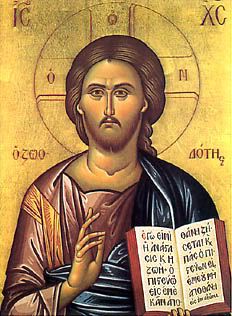 So I have been reading and hearing some about the Eastern Orthodox Church, particularly their emphasis on experiencing God face to face rather that theoretically or intellectually. It has started me thinking about exploring some of what they know, and seeing for myself whether the East might hold some of the secrets that the West has been searching for.
So I have been reading and hearing some about the Eastern Orthodox Church, particularly their emphasis on experiencing God face to face rather that theoretically or intellectually. It has started me thinking about exploring some of what they know, and seeing for myself whether the East might hold some of the secrets that the West has been searching for.Part of this stems from my Church history studies this semester. The course has looked at both the Western tradition (Clement, Justin Marytr, John Chrysostum, Augustine, Luther, Thomas Aquinas, etc) and at the Eastern tradition (Cyril of Jerusalem and others). I have to say, my heart has tended toward the pneumatology of the East, rather than the neoplatonic intellectualism and scholasticism of the West.
The appeal that Eastern theology has to me is that it is more experiential than theoretical. I attend what could be called a mixed-bag church. We have some Pentecostals there, we have some folks from liturgical traditions, we have some folks who are Baptists or Episcopalian or Presbyterian. It is a loose conglomeration of traditions. But there is no real hierarchy other than there is a pastor, and what is called a design team, which seems to me to be a borrowing of corporate terminology for the more traditional "elders board" or "vestry" that other churches have.
But what we don't have is a tradition. We don't have 1,000 or more years of the way things are done to fall back on. From my church history studies, that seems to always have been the tension - between the more stable, established, hierarchical church and the more spontaneous, less structured, independent type of church.
There are good and bad things with each. In the hierarchical church, sometimes the fire of newness is missing because it "conflicts with our tradition." So some of the freshness can be lost because we become unable or unwilling to change.
In the independent church, some of the accountability of the liturgical church is missing. There is a safety if you like in having to answer to a superior. Even Pope John Paul II wanted to enter the monastery at least twice in his career, but he had a bishop who steered him away from that idea, and more toward academic and ecclesiastical pursuits.
Liturgically, our church has a sort of tradition (we start by singing, then there are the creeds, then the scripture, then announcements, communion, more singing, offering, and then sermon). It is not written down, but it is "what we do."
-Musically most of the songs are the type one would hear on a "contemporary Christian" station -- Matt Redman, Darlene Zscech, Third Day, Paul Baloche, Michael W. Smith -- performed by a five-piece group with the senior pastor leading the singing. Sometimes people really enter into worship and other times it's like they are just watching, not really entering into the sacredness of what is going on.
And sometimes I find myself longing for the hymns I used to hear in the Episcopal Church -- (Let All Mortal Flesh Keep Silence, etc) or even for some of the cantillation of scripture High Churches favor. I also like the smell of incense and anointing oil - they remind me of the sacredness of what we are doing.
Our pastor has been teaching a lot about silence and solitude and how they are necessary for spiritual growth. I think it might be interesting to have a church worship service where there was no music, no PowerPoint, we didn't lower the lights, no videos, etc. We just gathered, and sang what God had put on our hearts, and expressed in that moment what the Holy Spirit was saying - either through scripture or intuitively. Or maybe we could sing the psalms like the desert monks did long ago. I just think it would be neat to practice some of the silence he has been talking about corporately.
No comments:
Post a Comment